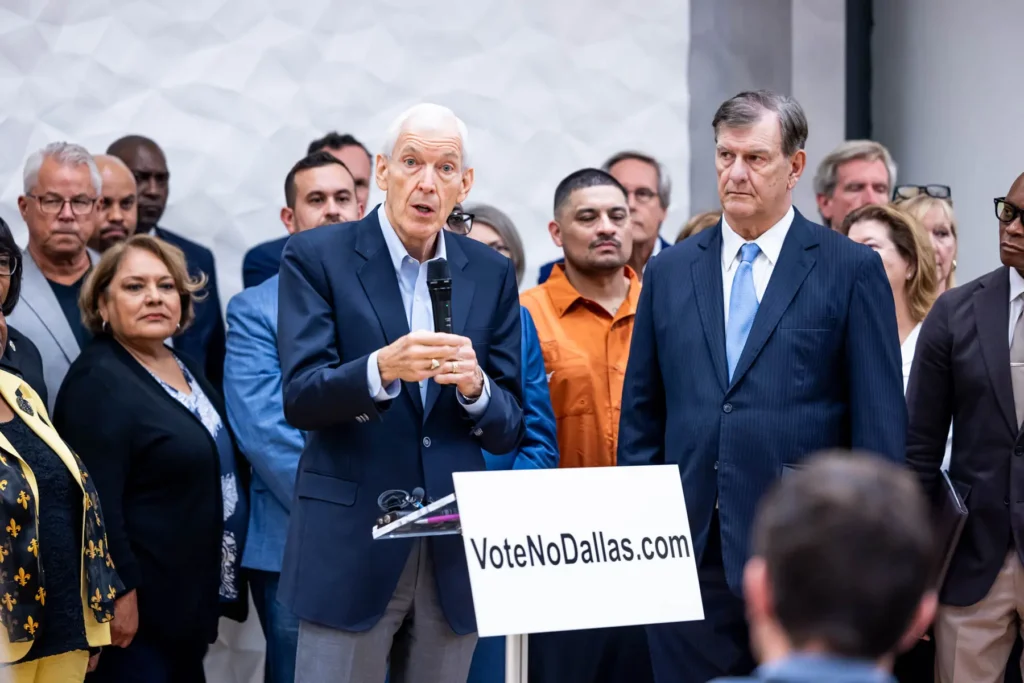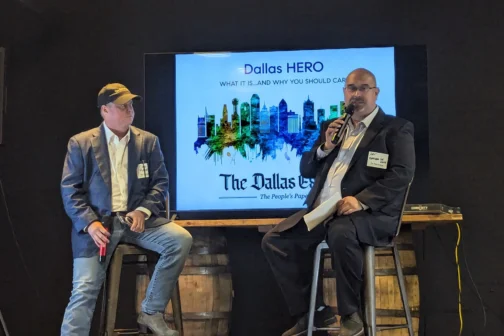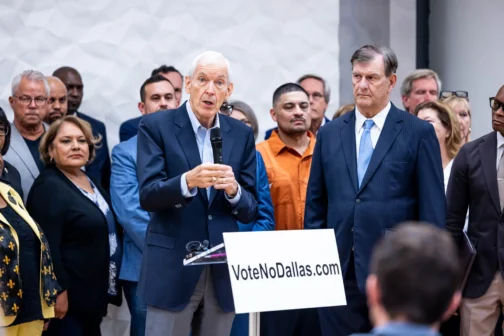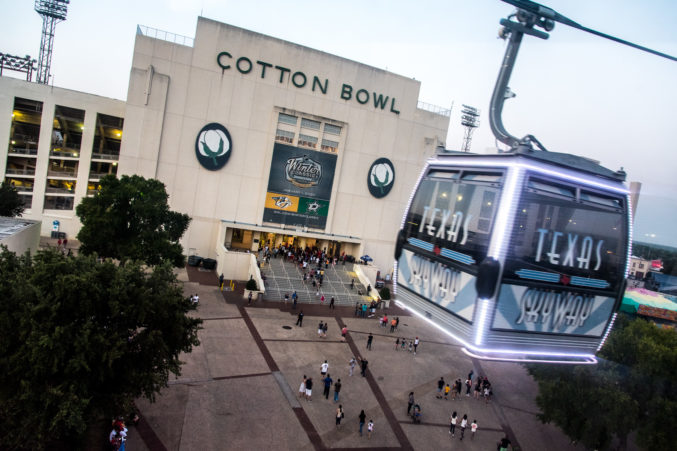The passage of propositions S and U marks an interesting inflection point for how Dallas has traditionally taken care of its political business. An upstart group of well-funded Park Cities residents used tactics most often found in state and federal elections—endorsements from astroturf groups, social media barrages, a political nonprofit that doesn’t have to reveal its donors, and an online publication owned by the effort’s funder—to overcome the opposition of the city’s business and political class.
State law requires cities to review their charter every 10 years and ask voters to approve changes. It also gives residents the ability to place their own changes onto the ballot for consideration, so long as they garner enough signatures. A group called Dallas HERO did exactly that. These propositions were packaged with the November election, when turnout is far higher than the sleepy May municipal elections. (Turnout in the last mayoral race, in May 2023, was about 9 percent. Tuesday’s was about 57 percent, per the county.) Advocacy is more difficult. This was a test of whether the Dallas way of politicking and organizing could beat a nimbler opponent during a national election. It didn’t.
In the runup to Election Day, former Mayor Mike Rawlings sat for a Q&A with Dallas Morning News editorial writer Rudy Bush in front of the Dallas Breakfast Group. He met with senior citizens clubs and a neighborhood organization from Preston Hollow. The PAC his coalition stood up, Together for Dallas, sent text messages to voters asking them to oppose propositions S, T, and U, the bottom-of-the-ballot charter amendments that basically all local officials have said will spell doom for City Hall. This is standard operating procedure for the liminal space between early voting and Election Day in Dallas.
In the other corner was Dallas HERO. Theirs was a simple message: vote for their props to get more cops and more accountability for local elected officials. The opposition had the tougher task of pulling apart that messaging, explaining that what smelled good would taste spoiled, how the language in the amendments would force the city to do things it cannot afford and operate under conditions no other city has before. That’s a lot of work to pull off in a month, which is all the opposition had to work with after launching its campaign late in the process. HERO flooded the zone with mailers and online ads that existed in the gray area of election law and local ordinances, even forcing the city to send cease-and-desist orders for inappropriately using an image of Dallas police officers.
A little before polls closed at 7 p.m. on Tuesday, some of the opposition gathered in a small private room at the Dallas/Park Cities Hilton to watch returns. The mood wasn’t exactly dour, but it wasn’t a party. “I’m still nervous as a son of a gun,” said Kelvin Walker, the CEO of the Dallas Citizens Council. “You good?” he asked Rawlings. “We’ll see,” the former mayor replied.
The Citizens Council—once the city’s shadow government, now more of an advocacy group of prominent businesspeople—helped fund the PAC to organize against the propositions. Frank Mihalopoulos, the president of Corinth Properties, was there. North Dallas Councilmember Jaynie Schultz stopped by. So did Lynn McBee, the nonprofit executive and former mayoral candidate. Marvin Singleton, the executive vice president and public affairs expert at Hill + Knowlton, sat on a couch and reloaded the county’s election site. WFAA was projected onto a screen.
When the first tranche of early returns posted, Proposition S, which would allow residents to sue the city for violating any ordinance regardless of standing, was up 52 to 48 percent. They’d done some polling on the propositions to inform their messaging. “We learned that people like to sue people,” Rawlings said.
Over the next few hours, Proposition S ran up its lead. But T and U—the former would tie the city manager’s employment to a survey of residents, the latter required the city to hire 900 cops and spend half of all new revenue on funding the pension and cop raises—were in play.
HERO doubled down on Election Day. It had poll workers handing out materials in favor of the propositions outside some of the most popular polling locations, like the Oak Lawn Branch Library and Samuell Grand Rec Center. A van carrying a “vote S, T, U” electronic billboard roamed the city. Together for Dallas didn’t have any poll workers Tuesday.
About 8 p.m., WFAA turned to reporter Cole Sullivan, who provided an update to the camera from outside the hotel. He reported that the Dallas HERO folks believed Election Day would fall in their favor while early voting would go to the opposition. “I don’t know about that,” Rawlings said.
Sullivan was right. T failed. It took until 2:30 a.m., but U narrowly passed with 50.5 percent of the vote. S was never competitive. Together For Dallas conceded defeat on two of the three propositions in a press release on Wednesday.
“Propositions S and U and the citizen petitions that preceded them were drafted and sold with language intended to appeal to frustrated voters who do not feel that City Hall is responsive to their needs,” it read. “Taken together, these Charter election results should be a wakeup call for everyone who cares about local government and aspires to create a better Dallas for all. That includes our business community. We must work better and more proactively together.”
One of the takeaways is that there remains a deep sentiment among residents that City Hall isn’t delivering as it should. While violent crime in the city has declined each of the last four years, it takes an average of two hours for police to respond to incidents like robberies, assaults, major accidents, and in-progress auto thefts. Most people in Dallas are not exposed to violent crimes. But property crimes? Everyone on both sides of the propositions agrees that we have too few officers: about 3,100, down from closer to 3,600 a decade ago. Dallas HERO won by putting the issue in front of voters and targeting their concerns about safety and accountability.
The Dallas Regional Chamber, the largest chamber of commerce in North Texas, waited until just before early voting to come out in opposition. Mayor Eric Johnson stayed on the sidelines, which, sources say, prompted former mayors Rawlings, Tom Leppert, Laura Miller, and Ron Kirk to get involved.
Reporting in local and state media over the last few weeks uncovered details about the people behind HERO. Monty Bennett, the CEO of Ashford Hospitality and the publisher of the Dallas Express online outlet, said he contributed money and office space to the effort. The Texas Observer unfurled how he does his political business: hired actors, misinformation campaigns, negative articles on his website, and a lot of money. Dallas HERO touted endorsements from some of the organizations identified in that story. The News published a piece that raised questions about how HERO solicited its signatures.
A day before the election, Dallas HERO’s executive director, Pete Marocco, was revealed to have been inside the U.S. Capitol during the January 6, 2021, insurrection. Before this, the largest cop and firefighter unions in the city announced their opposition to the three propositions. A collective of those four former mayors, dozens of City Council members, county commissioners, and sitting and past state representatives stood together to ask voters to say no.
In the past, this sort of media coverage would generally be enough to turn off voters. Institutions don’t carry the same power they once did, even locally. But this time, be that because of broad frustration with City Hall, a desire for more officers, or just straight favoring the propositions, none of these matters moved the needle enough to make a difference. As columnist Sharon Grigsby wrote today in the News, it seemed some voters were simply unaware they’d be voting on these propositions before they got in line.
The political establishment’s longtime strategies to get its way at the polls failed. A report Wednesday morning in the Dallas Express included a glimpse of what could come next: “The HERO amendments also may serve as a blueprint for safety-conscious citizens to enact government changes in cities where crime and homelessness have impacted businesses and the quality of life of residents.”
Author







